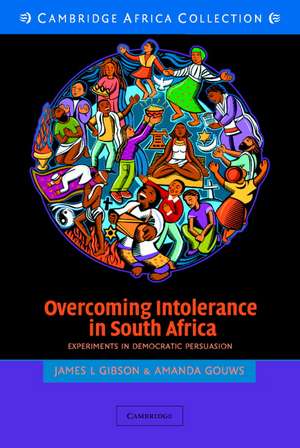Overcoming Intolerance in South Africa South African Edition: Experiments in Democratic Persuasion: Cambridge Studies in Public Opinion and Political Psychology
Autor James L. Gibson, Amanda Gouwsen Limba Engleză Paperback – 23 oct 2002
Din seria Cambridge Studies in Public Opinion and Political Psychology
-
 Preț: 166.99 lei
Preț: 166.99 lei - 14%
 Preț: 694.64 lei
Preț: 694.64 lei -
 Preț: 227.65 lei
Preț: 227.65 lei -
 Preț: 205.84 lei
Preț: 205.84 lei -
 Preț: 267.95 lei
Preț: 267.95 lei -
 Preț: 268.38 lei
Preț: 268.38 lei -
 Preț: 364.26 lei
Preț: 364.26 lei -
 Preț: 223.29 lei
Preț: 223.29 lei -
 Preț: 223.29 lei
Preț: 223.29 lei -
 Preț: 227.45 lei
Preț: 227.45 lei -
 Preț: 226.46 lei
Preț: 226.46 lei -
 Preț: 287.28 lei
Preț: 287.28 lei -
 Preț: 288.25 lei
Preț: 288.25 lei -
 Preț: 263.00 lei
Preț: 263.00 lei -
 Preț: 229.56 lei
Preț: 229.56 lei -
 Preț: 287.87 lei
Preț: 287.87 lei - 11%
 Preț: 556.32 lei
Preț: 556.32 lei -
 Preț: 286.89 lei
Preț: 286.89 lei -
 Preț: 225.20 lei
Preț: 225.20 lei -
 Preț: 280.91 lei
Preț: 280.91 lei -
 Preț: 201.59 lei
Preț: 201.59 lei - 11%
 Preț: 573.26 lei
Preț: 573.26 lei -
 Preț: 271.98 lei
Preț: 271.98 lei -
 Preț: 285.75 lei
Preț: 285.75 lei - 11%
 Preț: 554.48 lei
Preț: 554.48 lei -
 Preț: 260.11 lei
Preț: 260.11 lei -
 Preț: 322.89 lei
Preț: 322.89 lei -
 Preț: 384.34 lei
Preț: 384.34 lei -
 Preț: 224.62 lei
Preț: 224.62 lei -
 Preț: 265.11 lei
Preț: 265.11 lei
Preț: 370.37 lei
Nou
Puncte Express: 556
Preț estimativ în valută:
70.87€ • 73.99$ • 58.65£
70.87€ • 73.99$ • 58.65£
Carte indisponibilă temporar
Doresc să fiu notificat când acest titlu va fi disponibil:
Se trimite...
Preluare comenzi: 021 569.72.76
Specificații
ISBN-13: 9780521533621
ISBN-10: 0521533627
Pagini: 352
Dimensiuni: 152 x 228 mm
Greutate: 0 kg
Editura: Cambridge University Press
Colecția Cambridge University Press
Seria Cambridge Studies in Public Opinion and Political Psychology
Locul publicării:New York, United States
ISBN-10: 0521533627
Pagini: 352
Dimensiuni: 152 x 228 mm
Greutate: 0 kg
Editura: Cambridge University Press
Colecția Cambridge University Press
Seria Cambridge Studies in Public Opinion and Political Psychology
Locul publicării:New York, United States
Cuprins
Part I. Introduction: 1. Political tolerance in new South Africa; 2. The South African context; Part II. South African Intolerance As It Is: 3. The nature of political intolerance in South Africa; 4. Social identities, threat perceptions, and political tolerance; 5. Making tolerance judgments: the effect of context, local and national; Part III. South African Intolerance As It Might Be: 6. The pliability of tolerance and intolerance; 7. The law and legal institutions as agents of persuasion; 8. Becoming tolerant? Short-term changes in South African political culture; 9. Conclusions: experimenting with tolerance in new South Africa.
Descriere
This book investigates the degree to which political tolerance affects democratic reform in South Africa.
